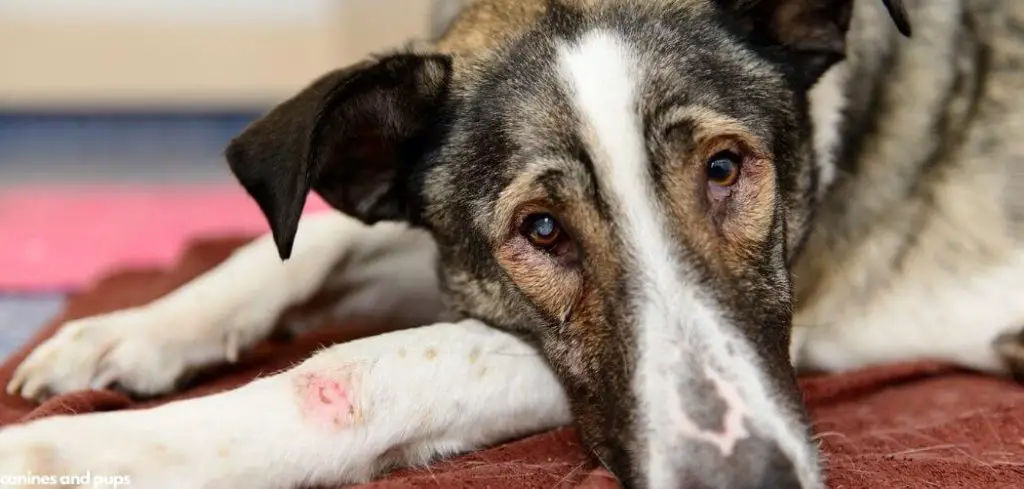Panting is normal for dogs after exercise or on a warm day, but when a dog with cancer begins panting excessively or suddenly, it can be a worrying sign.
We outline the common reasons why a dog with cancer may pant, what you can do, and when to seek veterinary help.
Table of Contents
Dog Cancer and Panting — Why It Happens
Dogs with cancer may pant for several reasons, ranging from pain and stress to organ complications. Tumors can cause discomfort, breathing difficulties, or internal pressure that makes it harder for a dog to breathe normally.
Certain cancers may affect the lungs or chest cavity directly, while others create systemic effects such as anemia or hormonal imbalances that contribute to panting.
Some dogs may also pant due to side effects of medications like steroids or chemotherapy. In every case, panting is a signal that the body is under strain and needs careful attention.

Dog Cancer and Panting: Common Causes
Pain and Discomfort
Cancer often causes pain, especially if tumors press against internal organs, nerves, or bones. Dogs cannot verbalize discomfort, so panting becomes one way to cope with pain.
A dog that seems restless, avoids lying down, or pants heavily at rest may be signaling that their pain is not well managed.
Uncontrolled pain can quickly reduce a dog’s quality of life, so panting in this context should always be taken seriously.
Read more: Dog with Cancer and Diarrhea (What it could mean)
Tumors in the Chest or Lungs
Cancers that develop in or around the chest cavity, such as lung cancer or metastatic tumors, can make it harder for a dog to breathe.
These tumors may reduce lung capacity or create fluid buildup, leading to labored breathing and panting. Dogs might also cough, tire quickly, or prefer sitting up instead of lying flat.
Panting due to reduced oxygen levels is a red flag that requires urgent veterinary care.
Anemia from Cancer
Some cancers, particularly those affecting the spleen or bone marrow, can lead to anemia. When red blood cell counts drop, less oxygen is carried through the body.
Dogs with anemia often pant heavily even when resting, as their body works harder to circulate oxygen. Other signs can include pale gums, weakness, or collapse.
Panting caused by anemia is always serious and typically demands immediate veterinary intervention.
Stress and Anxiety
Living with cancer is stressful for dogs, especially if they are experiencing frequent vet visits, new medications, or changes in routine.
Stress and anxiety can trigger panting in otherwise healthy dogs, and this effect is amplified when a dog is already weakened by illness. Dogs may pace, hide, or cling to their owner while panting heavily in response to stress.
While stress-related panting may not always be life-threatening, it signals that a dog is struggling emotionally as well as physically.
Side Effects of Medication
Dogs with cancer are often treated with steroids like prednisone or with chemotherapy. Steroids commonly cause increased panting, along with increased thirst and appetite.
Chemotherapy can also create side effects such as nausea, weakness, and shortness of breath that lead to panting.
While some panting from medications can be expected, any sudden worsening should be reported to a veterinarian.
Heat Intolerance
Dogs with cancer may have reduced ability to regulate body temperature. This means they may pant excessively even in mild weather or indoors.
Heat intolerance becomes especially dangerous if a dog is already weak or dealing with breathing issues, since their body cannot cool itself effectively.
Read more: Dog Cancer and Shaking (Here’s why)
What to Do If Your Dog Is Experiencing Cancer and Panting
If a dog with cancer begins panting more than usual, owners can take a few steps at home to help them stay comfortable. Providing a cool, quiet resting place can reduce heat-related stress.
Ensuring they have fresh water nearby at all times helps prevent dehydration.
Gentle reassurance, soft bedding, and a calm environment can also ease anxiety-driven panting.
Discuss pain management openly with the veterinarian, since many dogs benefit from adjustments in pain medication or additional supportive therapies.
If the panting is linked to medication side effects, the veterinarian may recommend dosage changes or alternative treatments.
Keeping a log of when the panting occurs, how long it lasts, and what other symptoms accompany it can also help the vet make more informed decisions.
When to Call or Visit Your Vet
Panting in a dog with cancer should never be ignored, especially if it comes on suddenly or grows progressively worse.
If panting is accompanied by coughing, wheezing, pale gums, collapse, or severe lethargy, immediate veterinary attention is essential.
Difficulty breathing or panting that does not ease with rest or cooling should also be treated as an emergency.
Even if the panting seems mild, a call to the veterinarian is wise. Panting may indicate that pain management needs to be adjusted or that the cancer is progressing.
Regular communication with the veterinary team ensures that the dog’s comfort and quality of life remain the priority.
Read more: Dog Panting Excessively (Should you worry?)
Key Takeaway
Panting in a dog with cancer is a signal that the body is under stress, whether from pain, organ involvement, anemia, medication side effects, or emotional strain. While some panting can be expected, excessive or sudden panting should always be taken seriously.
Owners should focus on creating a comfortable, cool, and stress-free environment while working closely with their veterinarian to manage symptoms.
Prompt veterinary care not only improves comfort but can extend quality of life for dogs living with cancer.
